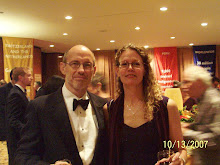This needs no blog response. It's a must read for all liberals and conservatives who want to win the war on terror. Printed today in the The Washington Times!!!!
Go To: www.washingtontimes.com
Send your letter to the editor to: Letters@washingtontimes.com
________________________________________
To win the long war
By Robert H. Scales
Published October 10, 2006
________________________________________
In war, words are more powerful than bullets. Written doctrines are blueprints for victory in battle.
Before the turn of the last century, Alfred Thayer Mahan wrote "The Influence of Sea Power upon History," a work that continues to influence blue water philosophies of modern navies. Between the world wars the Italian Giulio Douhet, author of "The Command of the Air," became the intellectual godfather of shock and awe when he proclaimed that airpower alone could guarantee victory without suffering the horrors of trench warfare. Mr. Douhet's disciples live on.
Militaries by their nature are conservative institutions and often the only true catalyst for change is failure. After the defeat in World War I, Gen. Hans von Seeckt, head of the German Reichwehr, described in his book, "Leadership and Battle," another way to avoid trench war in the principles of "blitzkrieg." Defeat in Vietnam induced the America's von Seeckt, Gen. William DePuy, to restore the integrity of the Army after its defeat in Vietnam by introducing "AirLand Battle" doctrine, essentially a new way of doing blitzkrieg American style.
War is the most perfidious of all forms of human intercourse. That truism was learned in spades after Desert Storm, when the tenets of "AirLand Battle," proven in high-tech warfare, quickly became a hindrance in the war against adaptive low-tech enemies. Experiences in Bosnia, Kosovo and Haiti reinforced in Iraq, Afghanistan and Lebanon now compel us to craft a new set of words that embrace all that we have learned at great expense in today's wars against Islamic insurgencies.
The words have appeared, brilliantly albeit it late in the season, with the publication of the Army and Marine Corps Manual 3-24, "Counterinsurgency." Today's DePuy sobriquet is shared by two remarkably gifted generals, the Marines' James Mattis and the Army's David Petraeus. Their fingerprints are on every page and explain in large measure why this volume, (unlike virtually all other doctrinal tomes of the Defense Department) is written in English...and makes sense... and deserves a place on military bookshelves next to Mr. Mahan, Mr. Douhet, Gen. von Seeckt and Gen. DePuy.
The power of the manual is contained in its paradoxes: a clever literary ploy the authors use to differentiate this war from those of the past and to shock old cold warriors out of their fixation on firepower and killing. The phrase "The more you protect the force the less secure you are" warns of the danger of hiding inside fortified base camps. "The more force you use the less effective you are," and "The best weapons do not shoot," argue that counterinsurgencies are fought with ideas rather than bullets. "Sometimes doing nothing is the best reaction," warns that impulsive, violent responses to enemy atrocities often play to its advantage.
The observation that in an insurgency "tactical success guarantees nothing" harkens back to Vietnam when, after the war, a retired colonel told his North Vietnamese counterpart, "you know you never defeated us on the battlefield," the reply was, "That may be so, but it is also irrelevant," a warning that we and our Israeli allies might well take to heart.
When the manual warns "if a tactic works this week, it will not work next week," it is teaching us that to win the long war we must focus on the human side of war. The services must become learning as well as fighting institutions able to adapt faster than the enemy. The manual recognizes what any young soldier or Marine can verify: that success can best be achieved by empowering the Army and Marine Corps at the lowest level. Counterinsurgencies are the business of lieutenants and sergeants.
Gen. DePuy once observed that "doctrine isn't doctrine unless 51 percent of the officer corps believes in it." At last our military has a counterinsurgency blueprint worthy of its powerful antecedents. The question now is whether or not our policy-makers will read it and our military leaders will believe in it enough to put it into practical form. Mr. Mahan's influence led to the creation of the world's great battleship fleets. Mr. Douhet gave birth to huge bomber fleets that pulverized German and Japanese cities. Gen. Von Seeckt created and Gen. DePuy resurrected fleets of heavily armored fighting vehicles that rolled across Poland, France, Kuwait and Iraq.
You will know if this manual gains traction when its tenets translate in a similar fashion: more soldiers and Marines to fight counterinsurgencies which the manual recognizes as long and manpower intensive; modernized land fighting systems and organizations optimized to reach distant regions, control areas, influence populations and shape opinions; the appearance of a land force that learns and adapts as well as it fights; and the beginnings of change in other government agencies, such as the Departments of State, Commerce and Justice driven by recognition, again highlighted in the manual, that counterinsurgencies are won on the diplomatic, political and economic front just as surely as they can be lost on the battlefield.
Retired Maj. Gen. Robert H. Scales is a former commander of the Army War College.
Copyright © 2006 News World Communications, Inc. All rights reserved.

